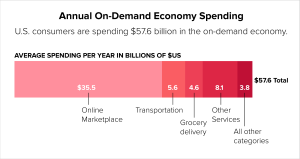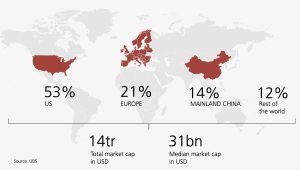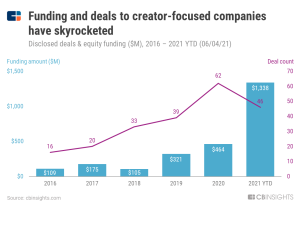3 rising global economies: on-demand, subscription and creator
What is the on-demand economy?
The on-demand economy is an ecosystem of consumers looking for immediate delivery of goods and services and companies fulfilling said demand via digital platforms.
Companies participating in the on-demand economy are digital-native and brick-and-mortar.

Image source: Pixelgrafia
Digital native companies are built around their digital platforms. The best examples are Uber, Airbnb and Glovo.
Brick-and-mortar companies like global tour operators, airlines and restaurants, which used to have a traditional “come to me” approach, changed their business model to include the “we come to you” approach specific to the on-demand economy.
The driving forces behind the rapid development of the on-demand economy are the smartphone and consumers’ search for convenience.
Why put in the effort to go out and get this product when you can click a button and have it delivered to your doorstep? It disrupted the way many companies did business and those that didn’t adapt, failed.

This is the case of Thomas Cook, the world’s longest-running travel agency.
Founded in 1845, the global leisure travel provider was operating in 17 countries, owned a fleet of aircraft and operated thousands of hotels around the world.
In 2019, the news of Thomas Cook’s bankruptcy came as a complete shock. Two of the reasons for the agency’s failure was 1) missing the opportunity to include the Millennials among its customers and 2) changing its business model too late.
Two years before the company’s downfall, Thomas Cook travel agents were still selling travel packages in high-street stores, while online sales in the UK were growing by as much as 30%.
While city breaks became in high demand among a new category of buyers with spending power and looking to travel the world, i.e. Millennials, Thomas Cook was stuck selling holiday packages to their parents and grandparents.
How big is the on-demand economy?
The on-demand economy is estimated to rise to 335 billion dollars by 2025, according to a PwC report.
What is the subscription economy?
The subscription economy describes a new business landscape in which traditional pay-per-product (or service) companies are moving toward subscription-based business models with customers paying a recurring price at regular intervals for access to a product or a service.

Image source: 2021 UBS report
The term subscription economy was coined by Zuora, an enterprise software company that creates and provides software for businesses to launch and manage their subscription-based services.
The subscription economy is not new. The first companies to participate in the subscription economy were news stations and other publishers whose readers paid a monthly fee to have newspapers and magazines delivered to their door.
More recently, other companies have entered this economy, some having to adapt to the global change due to the pandemic:
- Dog food companies: instead of going to the pet shop to buy food for their pets, pet owners can now subscribe to have their pet’s food delivered (PetPlate, Jinx, Crafted Kibble);
- Beauty care and makeup companies: the trip to your favourite beauty care and makeup shop has now been replaced with a subscription box to your favourite brand (GlossyBox, BoxyCharm, Birchbox);
- Meal plan suppliers: looking to eat healthily but don’t want to prepare the recipes? You can now subscribe to a meal plan of your choice and have it delivered every day (Pasta Evangelists, Raw Generation, Hello Fresh)
- Prescription drugs.
How big is the global subscription economy?
The global subscription economy is estimated to reach 14 trillion dollars in the near future, as detailed in a UBS report.
What is the passion/creator economy?
The passion economy is an ecosystem comprised of three elements:
- the creators who find, develop and sell products or services that make them unique;
- the market ie the people buying whatever products or services the creators offer;
- the digital platforms that enable the connection between creators and the market.

Image source: CBInsights
What are the new digital platforms that enable the creators in the passion economy and help them connect with a niche audience and scale their business?
Here are a few examples:
- Teachable, Podia and Thinkific are online course platforms allowing experts to monetize their knowledge;
- Mighty Networks is a platform helping creators build a business of their courses by tapping into the power of community (read more about Mighty Networks);
- Patreon and Buy Me A Coffee allow podcasters, video creators, and artists to earn a living from fans’ membership payments;
- VIPKid and Outschool allow people to earn a living from teaching;
- Substack allows writers to be paid directly by readers. In November 2021, the platform announced that it had more than 1 million paying subscribers. Bestselling authors Salman Rushdie (The Satanic Verses) and Chuck Palahniuk (Fight Club) are among the most influential writers on the platform.
- Lately, TikTok, YouTube, Snapchat and LinkedIn have jumped into the creator economy.
TikTok established the Creator Fund with the value of $1B to provide its best and brightest with the opportunity to earn money with their creative talent.
Snapchat is willing to pay $1 million daily for good content from creators on its platform. Snapchatters are invited to submit their top snaps to Spotlight and if the snaps go viral, the company is paying the creators a lot of money. Snapchatter Cam Casey has been paid nearly $3 million by the company for content that went viral. Learn how the rest of the platforms are leveraging the content creator economy.
How big is the global creator economy?
The creator economy is currently estimated at 104 billion dollars and is projected to grow to over 200 billion dollars by 2026, according to CB Insights.